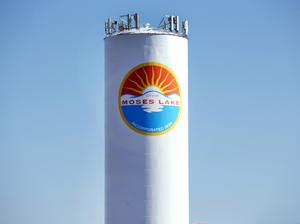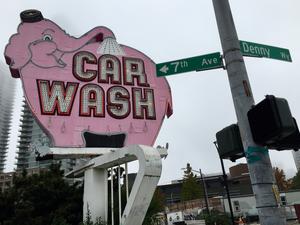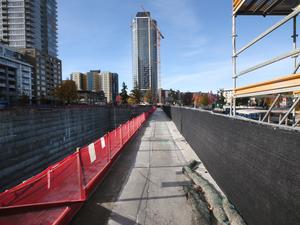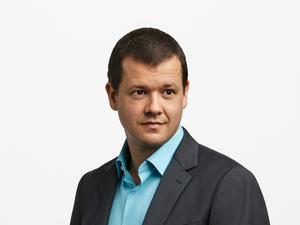Dustin Swartz sits in a Moses Lake coffee shop adorned with wicker furniture and plastic plants. In the shop, the clattering of a metal espresso machine mixes with soft pop music. The smell of hairspray comes in from the barbershop next door.
Swartz — who sports a thin brownish-red beard, a Patagonia hat and Ray-Bans hanging from the neckline — is a Moses Lake native and council member. He runs the family electrical business, J&M Electric.
He pulls out a tin of chewing tobacco mid-interview and inserts a pinch. He talks in a slow, thoughtful voice about the challenges and opportunities facing his hometown.
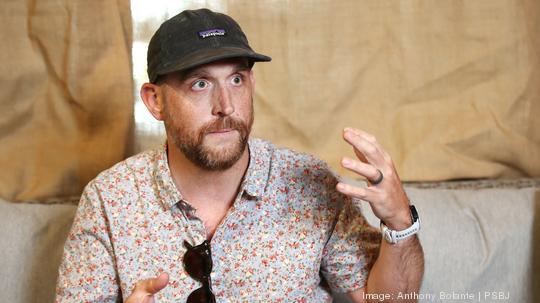
“We’re not running a backwater operation here,” Swartz says. “When I was going to high school, and my parents and my older siblings and all that, it was, ‘Where are you going after high school?’ Everybody leaves. The idea is, we don’t want that. We want some generational continuity here. I want my kids to grow up here and know they can stay here.”
Moses Lake has captured the attention of several large manufacturers in the U.S. and abroad. At first glance, it seems an unlikely hotbed for economic development with everyone from local officials to real estate professionals to the governor playing a role. The Central Washington city has capitalized on multiple infrastructure advantages to lure major employers to the area.
Now two venture-backed battery tech companies — Sila, based in Alameda, California, and Group14, based in Woodinville — have each outlined plans to launch large-scale manufacturing operations in Moses Lake in the coming years. They’re the latest industrial players to move into the roughly 25,000-person city in Grant County, adding to a list that includes Boeing, AeroTEC, SGL Carbon, Genie, REC Silicon and Fuji Chemical.
It has raised some serious questions among residents and city leaders about the best way to grow.
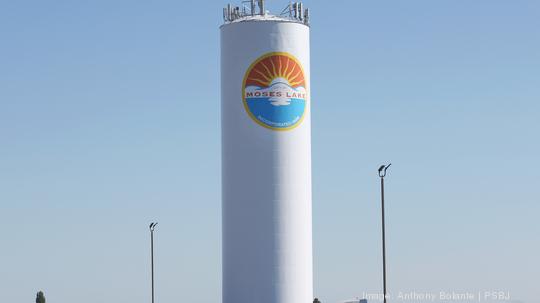
‘Now validated’
From the outside, Moses Lake seems an odd place for an industrial hub. Its status, however, is more than chance.
Moses Lake’s Grant County International Airport has one of the longest runways in the country. The airport hosted B-52 bombers during the Cold War and was an alternate for NASA space shuttle landings. When Boeing had to ground its 737 Max jets after two deadly crashes, the Moses Lake airport became an ideal place to park hundreds of unused jets.
The land is flat and easy to build on. The weather is predictable. But above all, its appeal is power. Cheap power.
Moses Lake boasts one of the cheapest electrical rates in the U.S. due to hydropower from the nearby Columbia River. For industrial companies using massive amounts of power, cheap electrical rates are a bottom-line lifesaver. Swartz says the Grant County Public Utility District can carve out good rates for certain employers, notably employers that hire many local residents, allowing the community to influence the types of companies that move in.
When major companies like Genie and Boeing began moving in, it was expected that others would follow.
Enter Sila and Group14. Both companies make a silicon-based anode powder designed to create smaller, cheaper and longer-lasting batteries.
The silicon-based anode powder replaces the traditional graphite powder found in most batteries today, the idea being that the silicon-based powder holds more charge than graphite. The difficulty for years with silicon-based batteries has been breaking and cracking in the batteries, but both Sila and Group14 think they have solutions to that problem.
“The technology is now validated. We have so many proof points from customers and partners that it’s indisputable this is the next generation of energy storage,” Group14 co-founder and CEO Rick Luebbe previously told the Business Journal.
Group14 is planning to break ground on a large-scale manufacturing facility in Moses Lake next year. In May, Sila announced the purchase of an over 600,000-square-foot facility in Moses Lake. Both facilities are expected to open in the coming years.
The money behind these battery material makers suggests serious investments ahead.
Looking ahead
There are a number of important milestones coming up for the battery tech industry in Moses Lake.
- Second half of 2023: Group14's slated opening for its Moses Lake facility
- Late 2023: REC Silicon slated time for first production after it reopens its Moses Lake plant
- Early 2024: REC Silicon's slated time for full production after it reopens its Moses Lake plant
- Second half of 2024: First production to start at Sila's facility in Moses Lake
- First half of 2025: Full production to start at Sila's facility in Moses Lake
Group14 raised $400 million in May, and Sila raised $590 million last year. Although both companies are starting with consumer electronics, their larger ambitions, and a big reason for their Moses Lake plans, center around electric vehicles.
While affordable power is a draw for Sila and Group14, Moses Lake is also home to REC Silicon, a polysilicon producer for the solar industry. A byproduct of REC’s production is silane, a gas crucial to both Group14 and Sila’s technology. The REC plant in Moses Lake had been dormant since 2019 due to the trade war with China, and although REC has another plant in Butte, Montana, a major investment from South Korean manufacturing company Hanwha Corp. earlier this year prompted an announcement in May to reopen the Moses Lake REC plant.
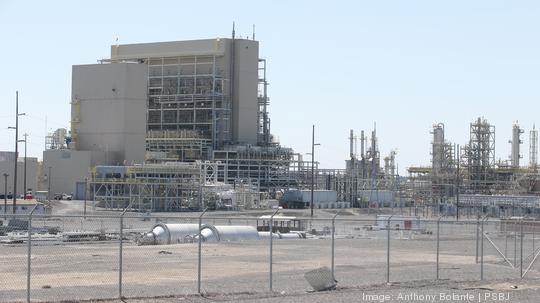
First production is slated for late 2023 with full production expected in 2024.
It’s still uncertain, however, just what the relationship will be between REC, Sila and Group14 in Moses Lake. REC previously told the Business Journal the company supplies silane to Sila and Group14 through its Butte facility for small-scale operations, but becoming a supplier of silane for the companies’ EV ambitions will take more convincing.
“In order to build a plant, we have to have some additional assurance that we’re going to have off-take. As these things start up, the worst thing we could do is isolate capacity to produce silane, build additional capacity to produce silane and then be sitting on an asset,” James May, CEO of REC, said previously.
Sila’s new facility is right across the street from REC. Group14, meanwhile, hasn’t disclosed where it plans to build its facility.
“It’s not an accident that us and Group14 ended up there,” Sila co-founder and CEO Gene Berdichevsky previously told the Business Journal.
‘A piece of the future’
The battery tech players might signal Moses Lake’s future as a green technology hub. Gov. Jay Inslee has pushed for the state to be a leader of these technologies, including a new tax credit for clean energy projects.
“We have the governor in the state very interested in making sure this technology landed here,” said Allison Williams, Moses Lake’s city manager. “You look where our state, our nation and world is heading with electric vehicles. This technology is a piece of the future.”
Congress’ recently signed Inflation Reduction Act, for example, carves out tax credits of up to $7,500 for buying new electric vehicles. Inslee followed California’s lead saying in August that Washington would ban the sale of new gas-powered cars, including SUVs and vans, in the state by 2035.
Both Sila and Group 14 will hire hundreds of workers to staff their facilities. Local leaders like Swartz and Moses Lake Chamber of Commerce Executive Director Debbie Doran-Martinez say the companies will likely hire many local workers while bringing in some outside talent, as well. Luebbe and Berdichevsky have both said the town’s strong industrial talent base is a big draw to opening in Moses Lake.
With an influx of new jobs on the horizon, however, local leaders also recognize familiar problems. Housing is at the top of the list, particularly for the younger generation.
“Those are our kids,” said Heather Adkinson, a Moses Lake broker with Windermere. “Those are the ones who were going to stay here, and they can’t afford to buy homes here any longer.”
Adkinson pointed to a house that had been on the market for more than $1 million for nine months and suddenly went pending after Sila announced its Moses Lake plans. She suspects it was a speculative purchase.
The rise in housing prices seems to be a two-pronged issue. Adkinson and her colleague Lynn Garza, a broker with Windermere in Moses Lake, also say there are buyers from the Seattle area who are taking full advantage of remote working policies and finding relatively inexpensive alternative housing in places like Moses Lake.
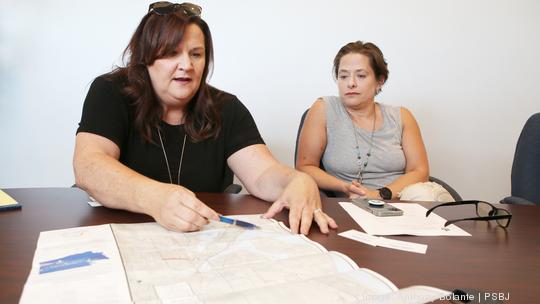
“I’ve been dealing the past year with a lot of Microsoft buyers,” Adkinson said. “They want lakefront. They want something for the weekends for their families. That has been a huge part of my referral business in the past year.”
Real estate company ASPI Group, one of the largest landowners in town, has been trying to develop a roughly 4,000-acre piece of land it calls Horizon at Moses Lake, which it says could be anything from “low-density residential to master-planned resort or employment-based communities” for the right developer.
“There is a lack of that middle housing or that affordable housing,” said Deanna Martinez, a nurse and Moses Lake council member. “I kind of hesitate about what developers are coming in and what kind of houses are being built.”
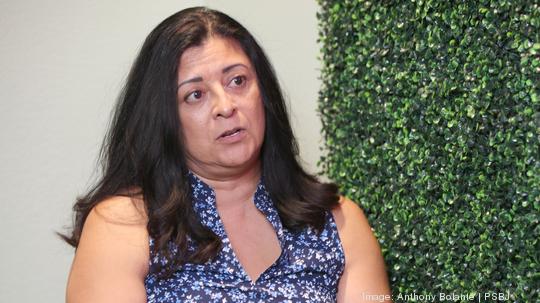
‘Really, really good dirt’
Kim Foster sells dirt. That is how Foster, the corporate counsel for ASPI and a 1977 graduate of the University of Washington, describes his job.
Foster lives in Gig Harbor but drives to Moses Lake weekly in a rental car provided by ASPI, which is owned by the Eastside-based Chen family. The Chens bought cheap land in Moses Lake decades ago and are now reaping the rewards of the industrial boom happening in town.
Foster said ASPI is one of two of the largest industrial landowners in town, but the group’s main competitor owns a concrete factory, so it benefits when ASPI gets a new tenant who wants to build.
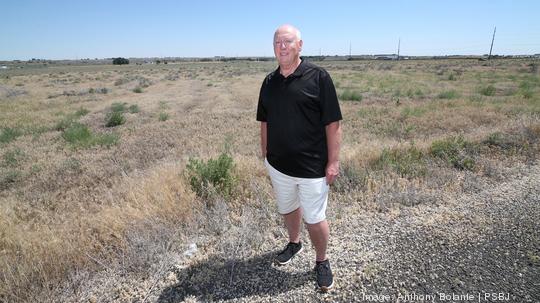
As he drives a gray Nissan SUV, Foster points out industrial sites in town like SGL Carbon and General Dynamics, which makes scatter bombs and missiles, giving a rundown of what each company does and how they ended up in Moses Lake. The leaders of forklift-maker Genie were actually fraternity brothers of Foster, and his guidance of them toward Moses Lake was one of the first dominoes to fall in the Moses Lake industrial renaissance.
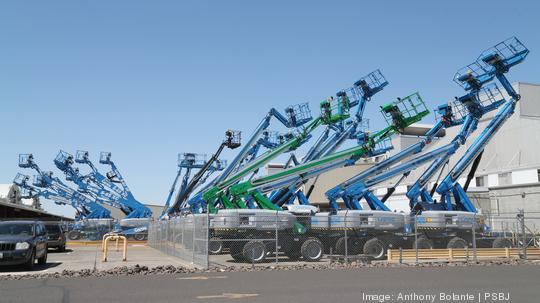
On either side of the road, wide-open plots of land are covered by green and brown sagebrush. Hangars, gravel lots and industrial buildings dot the landscape with dry hills in the distance providing the backdrop. A dust devil swirls in the distance.
Foster is now tasked with selling this dirt, what he clarifies is “really, really good dirt,” to corporate clients looking for a new industrial home. Hot leads are given code names, like “Project Juicebox” and “Project Metcalf.” He suspects Mitsubishi, which shuttered its Moses Lake Flight Testing Center in 2020, will be back.
A major advantage to Moses Lake, Foster says, is the depth and variety of industrial companies in town, since having so many businesses in town makes for a resilient economy and workforce.
“If everybody in town, all they know how to do is make speedometers for Camaros, and now all of a sudden you have somebody come into town who wants to make some other widget, the skillset is so defined in some of these other towns it makes it really difficult to quickly be resilient,” Foster says. “In Moses Lake, that’s a really interesting dynamic that a lot of people don’t fully understand.”
Foster says ASPI owns 700 acres of industrial-zoned properties, mostly around the airport. The firm also owns some retail space, notably the Moses Lake Town Center, and some residential properties, with the unfinished, theoretical Horizon project being the “crown jewel.”
Although ASPI doesn’t own the land where Sila and Group14 could build facilities, Foster called those moves “triples” compared to the “home run” of REC reopening.
In addition to cheap land and power, Foster says Moses Lake specializes in fast permitting so companies can start producing quickly after buying property in town. SGL, Foster says, was able to start producing within a year of buying its land.
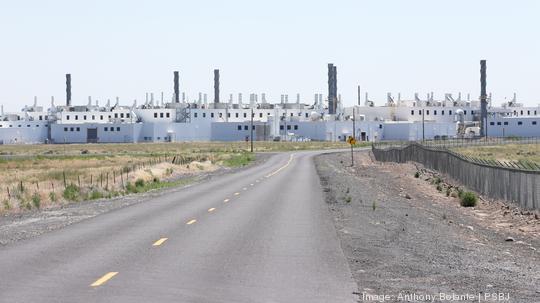
Moses Lake is also doubling down on its ability to supply workers for these companies. Big Bend Community College has courses in industry, aviation, business and health care, among others, and its location next to the airport allows students to get hands-on training. The Columbia Basin Technical Skills Center, meanwhile, allows students to get a jump on in-demand skills before graduating from high school.
“(Companies) want to hire local people,” said Brant Mayo, executive director of the Grant County Economic Development Council. “If our kids want to stay or want to come back, they’ve got diverse groups of opportunities here. If they want to be an engineer, or if they want to be a rocket scientist, we’ve got that here now.”
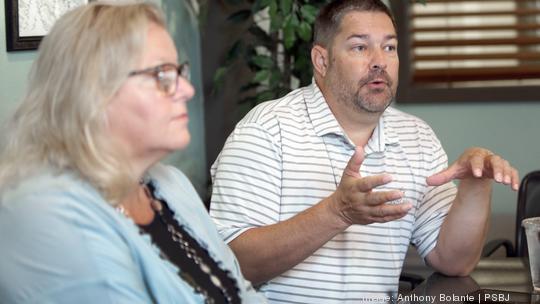
As for whether venture capital-backed companies are a riskier move for Moses Lake, it all comes back to selling dirt for Foster.
The property owners generally get paid upfront, be it a global giant like Boeing or a startup. If a company wants a build to go with their property, especially something unique that won’t likely be used by a new tenant down the road, it could face additional scrutiny, Foster says. But, he added, there is so much public information available about Group14 and Sila, there aren’t major concerns.
Rising costs
With more outside money finding its way into Grant County, affordability is a major concern for local residents.
- $59,165: the median household income in Grant County in 2020, according to U.S. Census data
- $99,158: the median household income in King County
- $355,000: the average home price in Moses Lake as of the end of July, according to Zillow
- 19%: the year-over-year increase in the average home price in Moses Lake from July 2021 to July 2022
- 13%: the year-over-year increase in the average home price in Seattle from July 2021 to July 2022
‘It’s exploding already’
At the core of Moses Lake’s future is a debate about the best way to grow. Foster and ASPI lean toward suburban developments with bike trails and baseball fields. Williams, the city manager, leans toward urban density and a bustling downtown. Others believe some mixture of both is likely.
The debate has spilled over into city council meetings as of late. The Moses Lake council in May had some back and forth about future city projects and how it will provide services like police and sewer. Its urban growth area (UGA) plans are part of the state’s Growth Management Act of 1990 designed to limit sprawl in smaller cities.
“They can still build houses out there, but if it’s not in our UGA then we’re not providing any services. It has to be all through the county,” said Dean Hankins, the former council-elected mayor of Moses Lake who resigned in August. “The landowners get upset if we take (land) out of the UGA because it’s not worth quite as much.”
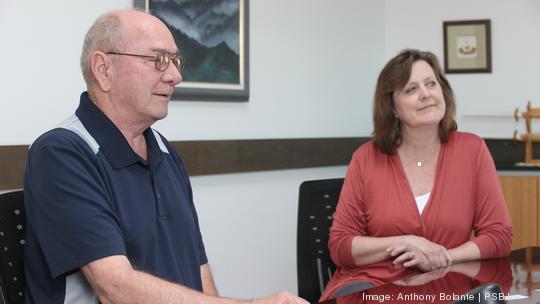
The debate over building out or infilling closer to downtown seems far from over.
Land owned by ASPI on the outskirts of town was going to be removed from the Moses Lake UGA before the city council decided to hold off. Now the city plans to reevaluate the UGA plan in 2023. The county ultimately decides what goes in the UGA.
When Foster thinks of competition in luring major industrial players, he isn’t worried about Seattle, Chicago and the Bay Area. He’s worried about open, suburban areas in Arizona, Texas and Tennessee.
The Phoenix-Mesa Gateway Airport, located on the far outskirts of Phoenix, and the surrounding area are a major competitor for Moses Lake, Foster says.
He constantly keeps an eye on these competitor regions to see what they are doing and how Grant County can keep up. It’s a major reason he and ASPI are so keen on the unfinished Horizon project.
Still, the issue remains that Moses Lake needs housing for all residents, not just those with the highest-paying jobs at fast-growing companies.
For Hankins, the influx of people working from home and buying homes with cash is a real concern. He’s lived in Moses Lake for more than 30 years, working in a variety of medical practices. He is semi-retired and jokes with Williams about her busy schedule, saying he took the mayor position because he was told, incorrectly, it wouldn’t be much work.
“The cost of housing, it’s exploding already just with the knowledge that people are coming here,” Hankins says. “For the people who already live here, who aren’t making high-money jobs, they’re being priced out of the home market.”
